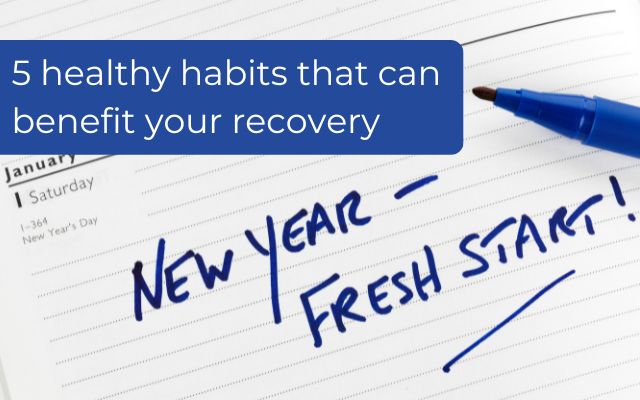Recovering addicts and alcoholics want to make practical changes to their lives. It’s January, let’s find ways to boost your addiction recovery in 2024! These aren’t your usual resolutions, but more routine activities that help keep us stable.

Top 5 New Year’s Resolutions for Recovery in 2024
1) Prioritise self-care:
Addiction can take a toll on your physical and mental health, so it’s important to make self-care a priority in your recovery. This can include things like getting enough sleep, eating a healthy diet, exercising regularly and practicing stress-reducing activities like yoga or meditation. People in early recovery may not have considered these seemingly simple things for a long time as one’s drug of choice tends to take priority in active addiction. It is important to create healthy self-care routines that can override one’s established routines based on years of abuse.
“Self-care is never a selfish act – it is simply good stewardship of the only gift I have, the gift I was put on earth to offer others. Anytime we can listen to true self and give the care it requires, we do it not only for ourselves, but for the many others whose lives we touch.”
― Parker Palmer, Let Your Life Speak: Listening for the Voice of Vocation
2) Learn new ways to cope with stress:
Addiction often develops as a way to cope with stress, so it’s important to learn new, healthier ways to manage stress in your life. This can include things like practicing mindfulness, learning to set boundaries and developing stress-reducing hobbies or activities.
3) Develop a daily routine
Establishing a daily routine can help you stay grounded and focused on your recovery. This can include things like setting regular times for meals, exercise, and self-care activities, as well as scheduling time for meetings and other recovery-related activities. It can be tempting to just ‘go with the flow’ as you may be used to doing before you began your recovery journey, but that lack of planning can lead to complacency and slip-ups.
4) Incorporate exercise into your routine
Exercise has been shown to have a positive impact on mental health and can help reduce stress and anxiety. It can also be a positive outlet for emotions and can improve overall well-being. Exercise is a powerful tool to make you feel good in general, and, good about yourself in particular.
5) Prioritise connection:
In addiction many people tend to isolate. A very important aspect of recovery is learning to connect with others again. As people progress in recovery, they may forget the importance of connection and fall back into familiar patterns of isolation. Don’t forget that recovery should not be a lonely journey and there is a lot of support available. Continue to attend 12-step fellowship meetings even if you have the urge to stay at home – an hour with other people in recovery will leave you with a powerful sense of belonging and feeling connected.
“Never underestimate the empowering effect of human connection.
All you need is that one person, who understands you completely, believes in you and makes you feel loved for what you are, to enable you – to unfold the miraculous YOU.”
― Drishti Bablani, Wordions
Implementing these healthy habits can help you maintain your sobriety and strengthen your recovery in the new year. It’s important to remember that recovery is a journey and setbacks may occur, but with the right tools, support and mindset, you can overcome them and continue to move forward.
Addiction Recovery In 2024 Adopt Small Daily Habits
Adopt small daily habits for effective addiction recovery in 2024 and learn how medical aid can help fund your rehab for lasting stability through the year. Changes team counsellors are here to help you.
Call Today
Here are a few more bonus tips for addiction recovery in 2024.
- Do one thing each day you don’t want to (AA JFT Card)
- Forgive yourself
- Purposeful pause (reflect on where you are. Make a gratitude list. The things in our life today are the things we prayed for and wanted a little ago, remember?)
- Are you spending frugally? Wisely? Developing a future for yourself?
- Tell a loved one something you like about them
- Is there a hobby or other recreational activity that you could start?
- Does your life have a balance between work, love and play?
- Are you getting enough exercise and eating mindfully?
Adopt small daily habits for effective addiction recovery in 2024 and learn how medical aid can help fund your rehab for lasting stability through the year. Changes team counsellors are here to help you.Addiction Recovery In 2024 Adopt Small Daily Habits








